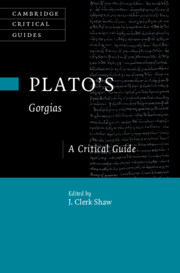Book contents
- Plato’s Gorgias
- Cambridge Critical Guides
- Plato’s Gorgias
- Copyright page
- Contents
- Contributors
- Abbreviations
- Introduction
- Chapter 1 Gorgias of Leontini and Plato’s Gorgias
- Chapter 2 Ancient Readers of the Gorgias
- Chapter 3 Philosophy and the Just Life in the Gorgias
- Chapter 4 Socrates and Coherent Desire (Gorgias 466a–468e)
- Chapter 5 The Ethical Function of the Gorgias’ Concluding Myth
- Chapter 6 Shame in the Gorgias
- Chapter 7 Desire and Argument in Plato’s Gorgias
- Chapter 8 Cooperation and the Search for Truth
- Chapter 9 Freedom, Pleonexia, and Persuasion in Plato’s Gorgias
- Chapter 10 Revealing Commitments
- Bibliography
- Index
- Cambridge Critical Guides
Chapter 1 - Gorgias of Leontini and Plato’s Gorgias
Published online by Cambridge University Press: 25 May 2024
- Plato’s Gorgias
- Cambridge Critical Guides
- Plato’s Gorgias
- Copyright page
- Contents
- Contributors
- Abbreviations
- Introduction
- Chapter 1 Gorgias of Leontini and Plato’s Gorgias
- Chapter 2 Ancient Readers of the Gorgias
- Chapter 3 Philosophy and the Just Life in the Gorgias
- Chapter 4 Socrates and Coherent Desire (Gorgias 466a–468e)
- Chapter 5 The Ethical Function of the Gorgias’ Concluding Myth
- Chapter 6 Shame in the Gorgias
- Chapter 7 Desire and Argument in Plato’s Gorgias
- Chapter 8 Cooperation and the Search for Truth
- Chapter 9 Freedom, Pleonexia, and Persuasion in Plato’s Gorgias
- Chapter 10 Revealing Commitments
- Bibliography
- Index
- Cambridge Critical Guides
Summary
This chapter considers the relationship between the historical Gorgias of Leontini and Plato’s portrayal of him and his ideas in the Gorgias. By drawing on fragments and testimonia of the historical figure, it shows that Plato’s understanding of Gorgias and his views informs both his characterization of the orator himself in the Gorgias, as well as that dialogue’s philosophical content and aims. In particular, three of the central themes of the Gorgias – ones that the character himself introduces – are prominent in Gorgias’ own works and in the doxographical reception of him: (1) the conception of speech as a form of power or dunamis; (2) the relation between power and wish or boulēsis and their joint role in human action; and (3) the contrast between – and contrasting relationships speech itself has with – belief on the one hand and knowledge on the other. Whether the historical Gorgias was ever personally committed to the relevant ideas in question or not, the chapter argues that he at least gave voice to them in his works, and that Plato, at least, evidently took them seriously as expressions of Gorgianic theory and practice.
- Type
- Chapter
- Information
- Plato's GorgiasA Critical Guide, pp. 7 - 26Publisher: Cambridge University PressPrint publication year: 2024

